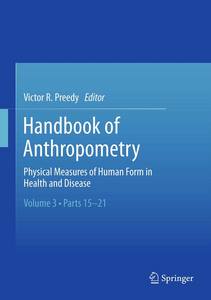Anthropometry and the response to dietary supplementation in exercise
Crowe, Melissa (2012) Anthropometry and the response to dietary supplementation in exercise. In: Preedy, Victor R., (ed.) Handbook of Anthropometry: physical measures of human form in health and disease. Springer, New York, USA, pp. 1785-1815.
![[img]](https://researchonline.jcu.edu.au/25680/2.hassmallThumbnailVersion/25680_Crowe_2012_cover.jpg)
|
Image (JPEG) (Book Cover)
- Cover Image
Download (48kB) |
|
|
PDF (Published Version)
- Published Version
Restricted to Repository staff only |
Abstract
A high proportion of athletes consume dietary supplements in the belief that they will enhance performance or alter body composition. Therefore, research into dietary supplements should accurately evaluate alterations in body composition, specifically muscle and fat mass (FM). A number of factors need to be considered in the selection of anthropometric methodologies to evaluate body composition changes due to dietary supplementation. These factors include measurement details (reliability, validity, accuracy and sensitivity), ethical factors such as invasiveness, statistical effect size and practical considerations such as time, cost and equipment availability. Researchers should first consider the statistical effect size of the supplement under study. Does previous research indicate a marked effect of the supplement on body composition? If so, then a less sensitive methodology can be utilised. Where previous research indicates only a small or negligible effect on body composition, the more sensitive anthropometric methodologies should be employed. The validity and reliability of the anthropometric technique is important. However, there is a lack of research into the reliability and validity of various anthropometric methodologies when assessed in conjunction with dietary supplementation. Examination of recent research into the most popular dietary supplements including creatine monohydrate, β-hydroxy-β-methyl butyrate (HMB), chromium picolinate, Tribulus Terrestris, ephedrine and L-carnitine, reveals utilisation of a wide variety of anthropometric methodologies with no particular methodology associated with detecting significant effects on body composition. Ephedrine, when combined with caffeine, and creatine are amongst the few dietary supplements consistently reported to alter body composition. Changes in hydration status can lead to confounding errors when assessing body composition and researchers should aim to minimise or control alterations in hydration status. Future research is needed in the area of anthropometry and dietary supplementation, particularly investigating the validity and reliability of various anthropometric techniques to detect change in body composition as a result of dietary supplementation. A greater availability of this information would assist researchers to choose appropriate anthropometric methodology to assess the effects of dietary supplements on muscle and FM.
| Item ID: | 25680 |
|---|---|
| Item Type: | Book Chapter (Research - B1) |
| ISBN: | 978-1-4419-1787-4 |
| Keywords: | dietary supplements, anthropometry |
| Related URLs: | |
| Date Deposited: | 19 Mar 2013 23:31 |
| FoR Codes: | 11 MEDICAL AND HEALTH SCIENCES > 1106 Human Movement and Sports Science > 110604 Sports Medicine @ 40% 11 MEDICAL AND HEALTH SCIENCES > 1111 Nutrition and Dietetics > 111101 Clinical and Sports Nutrition @ 20% 11 MEDICAL AND HEALTH SCIENCES > 1106 Human Movement and Sports Science > 110699 Human Movement and Sports Science not elsewhere classified @ 40% |
| SEO Codes: | 92 HEALTH > 9204 Public Health (excl. Specific Population Health) > 920411 Nutrition @ 50% 92 HEALTH > 9204 Public Health (excl. Specific Population Health) > 920499 Public Health (excl. Specific Population Health) not elsewhere classified @ 50% |
| Downloads: |
Total: 307 Last 12 Months: 3 |
| More Statistics |



